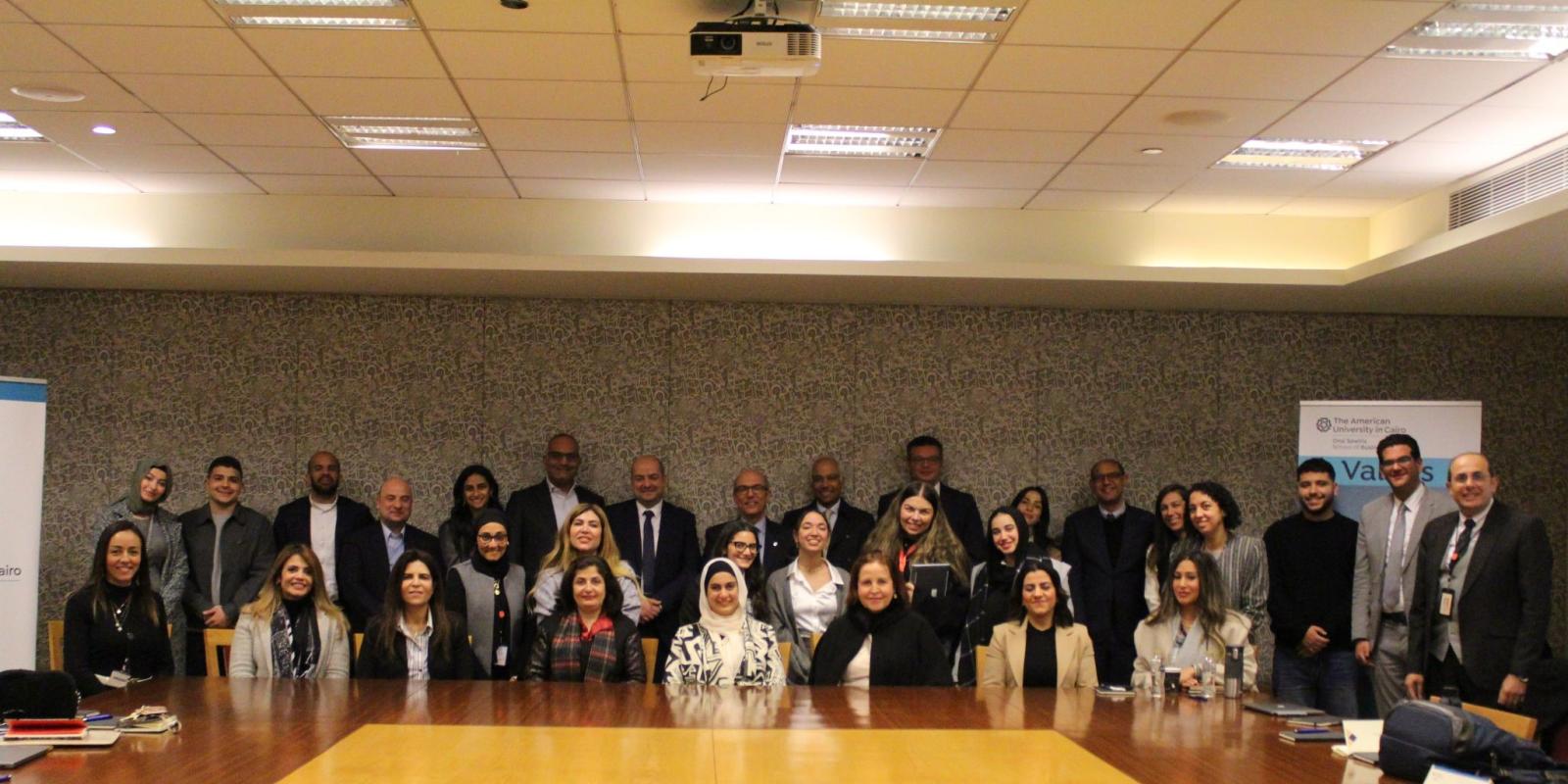
Onsi Sawiris School of Business Hosts Top Employers Roundtable 2025
Onsi Sawiris School of Business at The American University in Cairo recently hosted its annual Top Employers Roundtable, bringing together leading employers, faculty and key stakeholders to discuss the future of work and education.
The event, held on February 25, 2025, showcased the school’s ongoing efforts to bridge the gap between academia and industry, ensuring graduates are prepared to excel in a rapidly changing job market. The event was attended by 33 participants, including 12 senior representatives from nine of the school’s top employers, as well as faculty, staff and student representatives.
A Shared Vision for the Future
The roundtable provided a platform for collaboration and open dialogue, focusing on how universities and employers can work together to address the challenges of a rapidly evolving labor market.
Sherif Kamel, dean of Onsi Sawiris School of Business, opened the session by emphasizing the school’s commitment to aligning education with industry demands. Highlighting initiatives like the Co-op Program and Doing Business in Africa and the Middle East (DBiME), he noted how these programs provide valuable real-world experience for students, making them highly competitive in the job market.
“By bringing business into the classroom, we ensure our graduates are not just academically proficient but also ready to lead and adapt to the demands of a fast-changing world,” said dean Kamel.
Insights from Industry Leaders
Industry representatives shared valuable perspectives on the challenges and opportunities in today’s workplace.
Ahmed Nabil, HR senior manager at Orange Egypt, highlighted the transformative role of Gen-Z in the workforce, saying, “We expect Gen-Z to be transformers. They bring energy, innovation and passion, but it’s essential to guide them to balance their creativity with discipline and accountability.”
Similarly, Mostafa El Sharkawy, head of organization development at Banque Misr, noted how digital transformation is shaping workforce demands. “In our digital factory, Gen-Z employees are delivering exceptional results. Their tech-savviness and energy are driving innovation, but structured guidance is key to maximizing their potential,” he explained.
Leaders also pointed out that while younger employees bring fresh ideas, they often require support in developing deeper workplace competencies, such as resilience, financial acumen and cross-generational collaboration skills. These insights reaffirmed the importance of the school’s initiatives to provide students with hands-on exposure to real business environments.
Collaborating to Close the Skills Gap
The discussions underscored the importance of addressing critical skill gaps in areas like financial literacy, market awareness and responsible use of AI. Industry leaders emphasized that graduates need to balance technical expertise with foundational skills like problem-solving and adaptability.
“I expect that in a few years, all our employees will be using generative AI. It has to be part of the students’ core studies. I believe that those who will succeed are those who can effectively and efficiently use AI,” said Ahmed Nabil, HR senior manager at Orange Egypt.
Additionally, programs like the Co-op Program, which immerses students in real-world roles and case studies co-developed with businesses, were highlighted as effective methods for closing this gap. Employers expressed their enthusiasm for continuing collaboration with the school to ensure students are well-equipped for the challenges of the future.
As Nabil Diab, partner and COO at PricewaterhouseCoopers said, “Gen-Z brings a fresh perspective to the workplace. Their energy and ideas are invaluable, but nurturing these qualities alongside traditional skills is essential to ensure long-term success.”
A Path Forward
The Top Employers Roundtable 2025 concluded with a shared commitment to strengthening academia-industry partnerships. The school invited corporate leaders to remain actively engaged through mentorship programs, job shadowing opportunities and tailored workshops to prepare students for the demands of modern business environments.
The event served as a testament to Onsi Sawiris School of Business’s dedication to producing future-ready graduates who not only meet but exceed the expectations of employers. By fostering collaboration and innovation, the school continues to lead the way in transforming business education and shaping the workforce of tomorrow.
